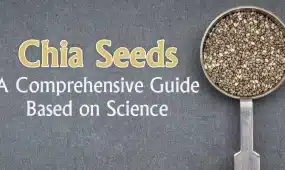Ashwagandha is a plant that is considered a small shrub with yellow flowers that are native to India and North Africa. The Ashwagandha plant is used in the form of extracts or powders from the plant’s root.
It’s also common to use its leaves to treat a variety of conditions. There have been many claims made about Ashwagandha.
This article will examine what Ashwagandha does in the body, how it is used, 5 claims about the plant, examine the research, and take a look at the possible side effects.
What is Ashwagandha?
Ashwagandha is considered a revered herb of the Indian Ayurvedic system of medicine as a tonic.
Ashwagandha[1] is commonly available as a churna, a finely sieved powder that can be mixed with water, clarified butter or honey. Studies have identified anticancer, antidepressant, cardioprotective, antioxidants, thyroid modulation, immunomodulation, antibacterial, neuroprotective, anti-fungal, anti-inflammatory, and hematopoietic activities.
Multiple research studies[2] have identified Ashwagandha as an herb that has many health benefits and if coupled with a healthy lifestyle it can be beneficial to your health.
What Does Ashwagandha Do?
Ashwagandha, an ancient medicinal herb, is believed to bolster brain function and the nervous system, potentially enhancing memory. Research suggests it may promote cognitive health, supporting memory retention and overall mental clarity.
Dr. Ryan Peterson says, Ashwagandha has a sedating or anxiolytic effect which may aid in the reduction of perceived stress. Ashwagandha has been utilized as a supplement for managing perceived stress because of this. Now, stress, when in high levels, can induce the rise of cortisol, a hormone which can activates the body’s sympathetic response causing the release of glucose or blood sugar in the bloodstream. When stress is managed through supplements that can decrease perceived stress, there may be a reduction in cortisol and aiding in the management of blood sugar levels.
Ashwagandha is also said to improve the function of the reproductive system[3] by promoting a healthy sexual and reproductive balance.
Health Benefits of Ashwagandha by Expert Dee Davidson, FDN-P | Video Credit: YouTube
How Is Ashwagandha Used?
Ashwagandha is considered an adaptogen, which was initially defined as substances that enhance the “state of non-specific resistance” in stress, physiological conditions linked with various disorders of the neuroendocrine-immune system.
A well-known example of an adaptogen is ginseng[2], which has been shown to enhance the body’s resilience to stress.
It is also used to provide the body with potent antioxidant properties, used to reduce blood sugar, used to reduce cortisol levels, reduce stress and anxiety, and increase muscle mass and strength.
Health Claims About Ashwagandha
1. Ashwagandha has claims to hold potent antioxidant properties that help protect against cellular damage caused by free radicals in our everyday environment
Ashwagandha has been shown to provide the body’s defense against certain diseases by improving the cell-mediated immunity.
It also holds potent antioxidant properties that help protect against cellular damage caused by free radicals in our everyday environment.
2. Ashwagandha can reduce blood sugar levels
In several studies, Ashwagandha has been shown to lower blood sugar levels by increasing insulin and improving insulin sensitivity in the muscle cells.
It has been shown to reduce blood sugar levels[3] in both people with diabetes and people who are considered “healthy” or not diagnosed with diabetes.
3. Ashwagandha has been shown to reduce cortisol levels
Cortisol is considered by many to be the “stress hormone.”
The following are typical examples of how the stress response operates as its intended survival mechanism[4]:
- 1. An individual is faced with a stressor.
- 2. A complex hormonal cascade ensues, and the adrenals secrete cortisol.
- 3. Cortisol prepares the body for a fight-or-flight response by flooding it with glucose, supplying an immediate energy source to large muscles.
- 4. Cortisol inhibits insulin production in an attempt to prevent glucose from being stored, favoring its immediate use.
- 5. Cortisol narrows the arteries while the epinephrine increases heart rate, both of which force blood to pump harder and faster.
- 6. The individual addresses and resolves the situation.
- 7. Hormone levels return to normal.
Now that we understand what cortisol does, we can understand why Ashwagandha may be beneficial to lower cortisol levels to in turn lessen the negative side effects that can occur if we have increased levels of cortisol.
4. Ashwagandha may help reduce stress and anxiety
Animal controlled studies using rats have reported that Ashwagandha has the ability to block the stress pathways in the brain of rats by regulating chemical signaling in the nervous system.
However, human studies have shown that symptoms of stress and anxiety can be reduced[5].
5. Ashwagandha may increase muscle mass and strength
Research has shown that Ashwagandha may improve body composition and increase strength. Some studies have determined a safe and effective upper limit.
The exercise regimen[6], if any, was unclear for each participant. For this reason, the relevance of the results is unclear.
The limited research available suggests that Ashwagandha may help increase muscle mass and strength.
What does the research tell us?
While there is a substantial amount of evidence that supports certain claims on the health benefits of Ashwagandha, more evidence and clarification within certain studies are needed.
It is considered an ancient medical herb with multiple health benefits. It is shown to hold potent antioxidant properties, reduce blood sugar levels, reduce cortisol levels, reduce stress and anxiety, and increase muscle mass and strength.
Ashwagandha supplementation could be considered a safe, easy and effective way to help improve your health and quality of life along with other healthy lifestyle factors. It is noted, that there can always be a drug or herb – nutrient interaction that can have an adverse effect on your health.
Also, not everyone reacts to medicinal herbs in the same manner.
It is advised, that people who are using any form of supplementation to seek guidance and recommendations from a medical professional (doctor) prior to use.
More Information
It is recommended that if you are experiencing any of the following symptoms or side effects to contact your doctor.
According to case reports, here is a list of other symptoms that may occur:
- Mild to moderate and transient: drowsiness, upper GI discomfort, abdominal bloating, or loose stools.
- Nausea, headache, stomach irritation: occurred in one study and was managed with other standard therapies
- Overactive thyroid
- Burning, itching, and discoloration of the skin
- Irregular heartbeat, dizziness
- Elevation of liver enzymes, skin rash, fatigue, fever, edema, and diarrhea
According to the Memorial Sloan Kettering Cancer Center, it provides information to patients and loved ones about herbs, botanicals, and other products.
According to the clinical summary, laboratory studies said Ashwagandha reduced the growth of breast, central nervous system, colon, and lung cancer without affecting normal cells, but was not effective against drug-resistant cancer stem cells[7].
Bottom Line
Ashwagandha can be an effective way to better your health. It is important to understand why you are taking this herb and the side effects it may have on your health.
Taking Ashwagandha could be an excellent approach to support an already diagnosed condition in conjunction with leading a healthy lifestyle.
SOURCES
Health Insiders relies on peer-reviewed studies, academic research institutions, and medical associations. We avoid using tertiary references. You can learn more about how we ensure our content is accurate and current by reading our editorial policy.
[1] Singh N, Bhalla M, de Jager P, Gilca M. An overview on ashwagandha: a Rasayana (rejuvenator) of Ayurveda. Afr J Tradit Complement Altern Med. 2011;8(5 Suppl):208-213. doi:10.4314/ajtcam.v8i5S.9
[2] Panossian A, Wikman G. Effects of Adaptogens on the Central Nervous System and the Molecular Mechanisms Associated with Their Stress-Protective Activity. Pharmaceuticals (Basel). 2010;3(1):188-224. Published 2010 Jan 19. doi:10.3390/ph3010188
[3] Gorelick J, Rosenberg R, Smotrich A, Hanuš L, Bernstein N. Hypoglycemic activity of withanolides and elicitated Withania somnifera. Phytochemistry. 2015 Aug;116:283-289. doi: 10.1016/j.phytochem.2015.02.029. Epub 2015 Mar 18. PMID: 25796090.
[4] Aronson D. Cortisol — Its Role in Stress, Inflammation, and Indications for Diet Therapy. Today’s Dietitian. Vol. 11 No. 11 p. 38.
[5] Chandrasekhar K, Kapoor J, Anishetty S. A prospective, randomized double-blind, placebo-controlled study of safety and efficacy of a high-concentration full-spectrum extract of ashwagandha root in reducing stress and anxiety in adults. Indian J Psychol Med. 2012 Jul;34(3):255-62. doi: 10.4103/0253-7176.106022. PMID: 23439798; PMCID: PMC3573577.
[6] Raut AA, Rege NN, Tadvi FM, Solanki PV, Kene KR, Shirolkar SG, Pandey SN, Vaidya RA, Vaidya AB. Exploratory study to evaluate tolerability, safety, and activity of Ashwagandha (Withania somnifera) in healthy volunteers. J Ayurveda Integr Med. 2012 Jul;3(3):111-4. doi: 10.4103/0975-9476.100168. PMID: 23125505; PMCID: PMC3487234.
[7] Ashwagandha. For patients and caregivers. Memorial Sloan Kettering Cancer Center. https://www.mskcc.org/cancer-care/integrative-medicine/herbs/ashwagandha#msk_professional. Updated June 29th, 2019.







 This article changed my life!
This article changed my life!
 This article was informative.
This article was informative.
 I have a medical question.
I have a medical question.
 Ask a Question
Ask a Question

 This article contains incorrect information.
This article contains incorrect information.
 This article doesn’t have the information I’m looking for.
This article doesn’t have the information I’m looking for.